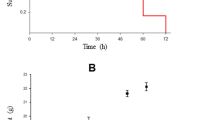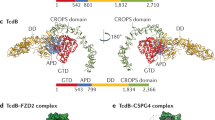Abstract
IT was reported previously that ethylenediamine tetraacetic acid was capable of protecting mice against the toxin of Clostridium perfringens 1. The protection thus afforded was shown to be probably due to the removal of a metallic ion or ions necessary for the activity of the toxin from the area where the toxin was acting. Inasmuch as the metallic ion or ions necessary for the action of the toxin apparently were higher in the preferential chelation series than calcium, the calcium chelate was shown to be able to protect when given systemically2. In this report, studies on the duration of the protection afforded by calcium ethylenediamine tetraacetic acid are presented and their implications are discussed.
This is a preview of subscription content, access via your institution
Access options
Subscribe to this journal
Receive 51 print issues and online access
$199.00 per year
only $3.90 per issue
Buy this article
- Purchase on Springer Link
- Instant access to full article PDF
Prices may be subject to local taxes which are calculated during checkout
Similar content being viewed by others
References
Moskowitz, M., et al., Science, 123, 1077 (1956).
Moskowitz, M., Proc. Soc. Exp. Biol. Med., 92, 706 (1956).
Author information
Authors and Affiliations
Rights and permissions
About this article
Cite this article
MOSKOWITZ, M. Mode of Action of Chelates in protecting against Clostridium perfringens Toxin. Nature 181, 550–551 (1958). https://doi.org/10.1038/181550a0
Issue Date:
DOI: https://doi.org/10.1038/181550a0
Comments
By submitting a comment you agree to abide by our Terms and Community Guidelines. If you find something abusive or that does not comply with our terms or guidelines please flag it as inappropriate.



